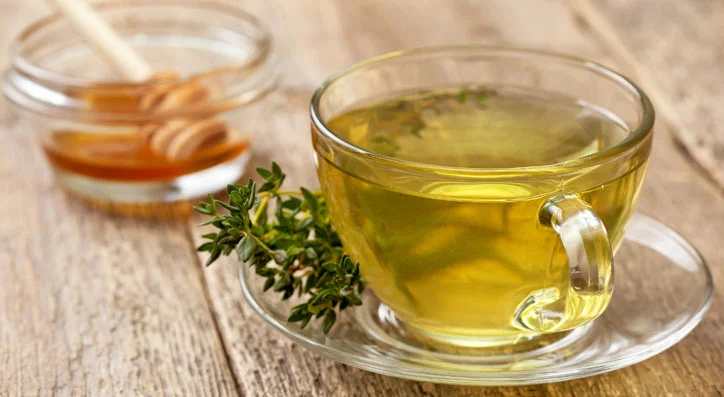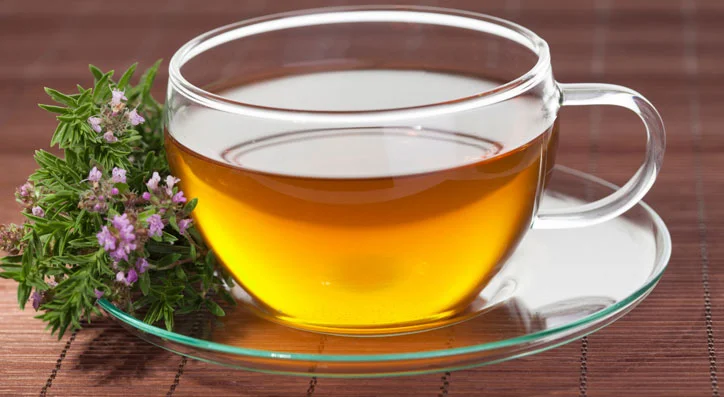Last Updated on December 16, 2021 by Dr Sharon Baisil MD
Thyme is one of the common spice or herb ingredients in our kitchens. Its distinctive minty flavor adds more to any dish. Thyme tea is also famous for its certain taste.
Apart from just a soothing taste, thyme tea is also very beneficial for one’s health. It can help handle a lot of bodily functions and systems at the same time.
Thyme tea is great for the body and overall health. It has many nourishing nutrients that can enhance the body’s performance and keep away several kinds of illness. The many antioxidant and anti-inflammatory properties of thyme tea make it a good addition to one’s diet.
Is thyme tea good for health?
As we mentioned earlier, thyme is indeed a very healthful herb, and its tea can have several beneficial effects on the body. Thyme tea is a boosting drink that can be a healthier substitute over many unhealthy daily beverage choices.
The use of thyme as a kitchen herb has been done since time immemorial. It was also a popular medicinal herb and still serves as a good agent of traditional medicinal ways of treatment.
Thyme tea is a flavored beverage and aromatic herb that is accompanied by its many mineral benefits.
The plenty of nourishing qualities of thyme tea is brought in by the several vitamins, minerals, and antioxidants found in it. The variety of herbal and potential active ingredients available in thyme tea adds to the health and keeps away different diseases. These active ingredients serve as powerful antioxidants that reduce oxidative stress in the body, leading to several health complications and chronic ailments.
It has many good effects on the body’s digestive system and overall metabolism, which is indirectly related to all functions of the body and the overall health of an individual.
In addition to this, thyme can also assist with calming inflammation and diseases in the body. Thyme tea has been used as a medicinal remedy for several ailments such as coughs, sore throats, etc.
Moreover, it is good for many types of health patients due to its minimal side effects. Thyme tea can be thus, be had by all with many accompanied health benefits.
It boosts immunity which controls the overall health and reduces health risks. You can also add other herbal or medicinal ingredients to thyme tea and make it even more nutritious.
Lemon and ginger are some of the major flavors added to thyme tea to enhance its taste and medicinal value.
Can diabetics have thyme tea?
Well, yes, thyme tea is good for the diabetic body. The many plant-based nutrients and several healthy antioxidants found in thyme tea can help with lower blood sugar levels in the body.
On top of that, thyme tea is also useful in the reduction of body weight. This might be very helpful for diabetic patients as they require keeping their body weights under controlled margins. Hence, drinking thyme tea can be very helpful in keeping away weight-related discomfort and issues.
Plenty of antioxidants can also help reduce the severing of some symptoms that diabetic patients experience. The reduction of oxidative stress also assists in keeping away other chronic diseases that can have more harm to the diabetic body.
The sugar-lowering effects on blood glucose levels help to keep the body away from other health risks.
However, there can be certain bad effects as well if thyme tea is over-consumed. It can lead to discomforts that we will discuss later.
Hence, it is best to get a doctor or health expert’s advice before resorting to this tea as a healthy remedy for any condition to ensure all safety and avoid potential risks.
But first of all, let us look at the many benefits of drinking thyme tea.
15 health benefits of thyme tea

Thyme tea is an herbal drink and has very low calories. It is a healthy drink with many advantages to all aspects of all.
Let us have a look at 15 such health benefits of thyme tea:
- Thyme tea has a lot of good effects on cardiovascular health. Research and experiments have found that the thyme herb can reduce heart rate among patients with high blood pressure. This is a risky condition for one’s health and can be treated to an extent with thyme herb made into tea. Thyme has the properties of reducing high blood pressures, which control other health ailments and decrease heart risks.
- The thyme herb is also used as and respirational remedy for problems of the lung. Thyme tea is flavorful and also has essential benefits on all the organs under the respiratory system. It is also known to have nutrients that reduce the risks of bronchitis and respiratory tract infections. Moreover, there are thyme essential oils found in thyme tea as well.
- Thyme tea is beneficial in soothing sore throats and coughs. Congestion and cold are commonly faced issues and can be soothed by drinking thyme tea. The many antioxidants and the essential oil from thyme leaves make a great remedy to alleviate cough and cold. This has been an age-old traditional remedy as well.
- Thyme tea can also supply you with many health elements that help boost the immunity power of the body. It is filled with vitamins A and C that are essential health nutrients, and uplift the body’s germ-fighting capacity. Moreover, vitamin A and vitamin C are also good for problems of seasonal cold and aid in curing many other related diseases.
- Thyme is an herb enriched with fiber. If you add it to your food as a spice or have it made into tea, you can benefit from this factor as well. The fiber in the body assists with improving overall metabolism. Hence, thyme aids in enhancing the digestive system functioning as well.
- Thyme tea is also credited for its effects on promoting weight loss. First of all, it has hardly any calories; hence, it is better than many other sugary beverages that lead to weight gain. In addition to this, drinking thyme tea can also suppress your appetite and reduce cravings. It also provides energy.
- Thyme is also useful in curing minor abdominal cramps and issues such as diarrhea and constipation. Hence, it maintains good digestive health that indirectly benefits other health systems and organs too.
- Thyme tea also has properties that strengthen bones. The presence of calcium, magnesium, vitamin K, and iron can make bones healthier and prevent the occurrence of bone-related disorders.
- Thymol found in thyme leaves is a strong natural antiseptic. It can be very helpful in treating infections and inflammations. In addition to this, it is also helpful to keep away oral odor and is often used as a mouthwash for these reasons.
- Thyme is also an aromatic herb that helps improve mood and has a therapeutic effect on controlling stress. It also relieves headaches. This benefit can be gained even with drinking thyme tea.
- Thyme tea is also good for the hair and is often utilized by many to treat alopecia. This is usually advantageous when you use thyme essential oil in combination with other beneficial hair oils.
- The presence of many nutrients, antioxidants, and anti-inflammatory elements in thyme can enhance overall body functioning and reduce the harms caused by free radicals. Besides, it keeps away inflammation like mouth ulcers, tonsils, and so on.
- Thyme tea is also an agent that fights cancer. It has been studied that thyme is effective in treating colon and breast cancer. The many nutrients like – oleanolic acid, beta-sitosterol, and lutein encourage the death of cancer cells.
- Thyme is also efficient in treating a movement-related neurological disorder called – Developmental Coordination Disorder (DCD), Dyspraxia. It is usually used effectively among growing children with this disorder.
- Thyme has several anti-bacterial and anti-fungal properties as well. It is thus used as a remedy for treating skin issues like acne, cuts, wounds, burns, scarring, etc. It can also help with decreasing symptoms like skin itchiness, eczema, blisters, etc. The antioxidants also add glow to the skin.
Thyme tea side effects

There are some minimal side effects to this tea as well. They are:
- Thyme might slow down the clotting of blood and must be used with prior caution. It is advised not to use thyme before or after surgeries.
- If you are allergic to plants and herbs in the same family, thyme might lead to uncomfortable symptoms and skin irritation as well.
- Improper usage of thyme can lead to headaches and nausea.
- Overconsumption can lead to an upset stomach and abnormal blood pressure too.
How to make Thyme tea?
You can easily make your thyme tea at home. Many prefer growing this herb in their gardens, but you can also get them otherwise.
Ingredients:
- Dried Thyme leaves (1 tsp.)
- Water (2 cups)
- Lemon (1 slice)
- Ginger (optional)
- Honey (optional)
Method:
- In the pot, add water and bring it to a boil. When boiled, put it to simmer.
- Add in the thyme tea leaves and cover the pot. Let it brew in simmer with a lid on top for around 3-5mins.
- Strain and cool it to your preference.
- Squeeze in some lemon, and it is ready to serve.
- You can also add in some ginger extract and honey if you wish to.
REFERENCES:
https://www.verywellhealth.com/the-benefits-of-thymus-vulgaris-88803




